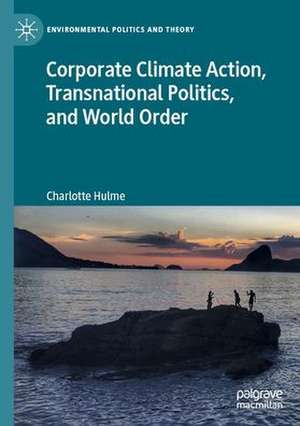Corporate Climate Action, Transnational Politics, and World Order: Environmental Politics and Theory
Autor Charlotte Hulmeen Limba Engleză Hardback – 26 iul 2023
Preț: 699.12 lei
Preț vechi: 822.50 lei
-15% Nou
Puncte Express: 1049
Preț estimativ în valută:
133.82€ • 145.41$ • 112.48£
133.82€ • 145.41$ • 112.48£
Carte tipărită la comandă
Livrare economică 22 aprilie-06 mai
Preluare comenzi: 021 569.72.76
Specificații
ISBN-13: 9783031341144
ISBN-10: 3031341147
Ilustrații: XVI, 259 p. 12 illus.
Dimensiuni: 148 x 210 mm
Greutate: 0.48 kg
Ediția:1st ed. 2023
Editura: Springer Nature Switzerland
Colecția Palgrave Macmillan
Seria Environmental Politics and Theory
Locul publicării:Cham, Switzerland
ISBN-10: 3031341147
Ilustrații: XVI, 259 p. 12 illus.
Dimensiuni: 148 x 210 mm
Greutate: 0.48 kg
Ediția:1st ed. 2023
Editura: Springer Nature Switzerland
Colecția Palgrave Macmillan
Seria Environmental Politics and Theory
Locul publicării:Cham, Switzerland
Cuprins
Chapter 1: Introduction.- Chapter 2: Change of Players, Change of Game.- Chapter 3: The Train Has Left the Station: Automotive and Energy-Intensive Industries.- Chapter 4: Climate Influencers: Technology.-Chapter 5: The Earth is Shifting Beneath Their Feet: Finance.- Chapter 6: The Emergent Corporate Climate Consensus.- Chapter 7: Superpowers, Inc.: Lessons on World Order.
Notă biografică
Charlotte Hulme is Assistant Professor of International Affairs and Deputy-Director of the Johnson Grand Strategy Program at the United States Military Academy.
Textul de pe ultima copertă
This book explores the origins and significance of the corporate climate action phenomenon, which has attracted increased attention in recent years. It examines how and why, during the 2010s, American, German, and Indian corporations spanning finance, technology, automotive, and energy-intensive industries adopted certain climate practices and converged around the idea that the private sector has a vital role to play in addressing climate change and advancing a lowcarbon future. It also considers how policy developments that states widely understood as watersheds, including the 2015 Paris Climate Agreement, simply confirmed what the private sector had long believed: that states lacked answers about how to achieve concerted, ambitious, and effective climate action. It was in this context, amid diminishing expectations for robust state climate action, that select corporations sought to fill a perceived leadership vacuum in an issue area poised to shape future global trends. Providing a novel assessment of the corporate sector as a climate actor, this book evaluates how the shift in the center of gravity in the climate change issue area away from national governments and toward other players may influence world order and impact an international security landscape increasingly defined by non-military challenges.
Charlotte Hulme is Assistant Professor of International Affairs and Deputy-Director of the Johnson Grand Strategy Program at the United States Military Academy.
Charlotte Hulme is Assistant Professor of International Affairs and Deputy-Director of the Johnson Grand Strategy Program at the United States Military Academy.
Caracteristici
Provides a novel assessment of corporate sector as climate actor Explores why German, Indian, and US finance, auto & energy corporations increased climate action in 2010s. Argues that corporate climate action filled a state leadership vacuum














